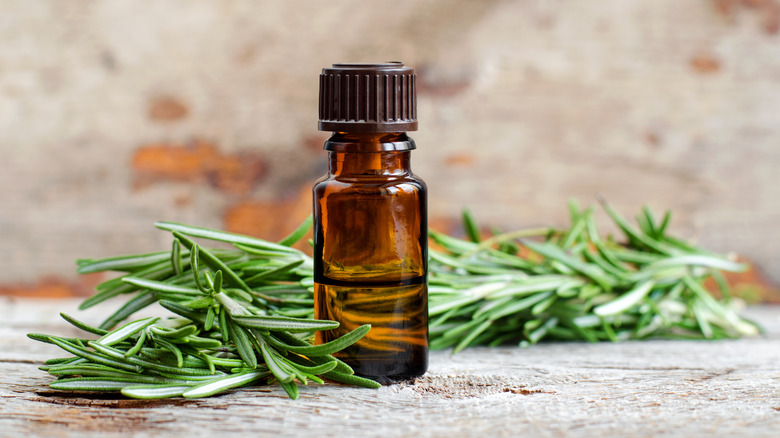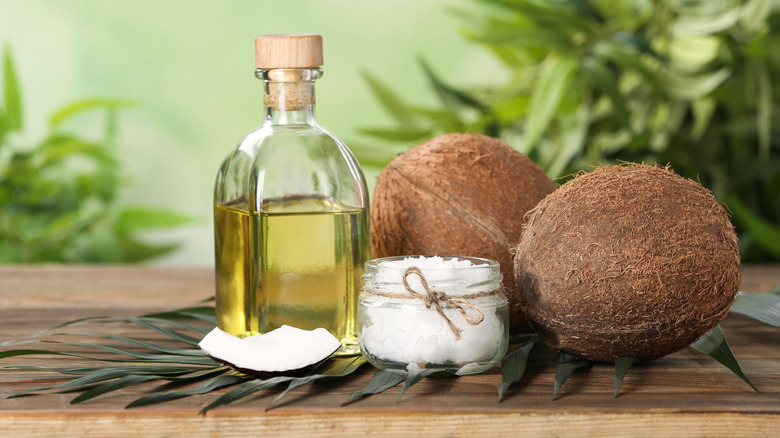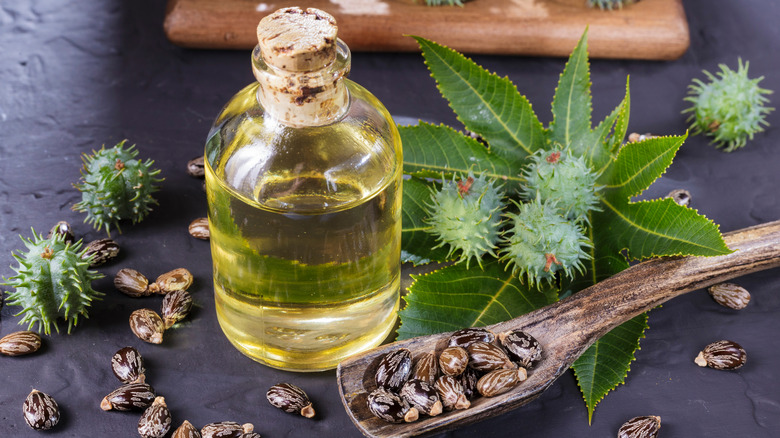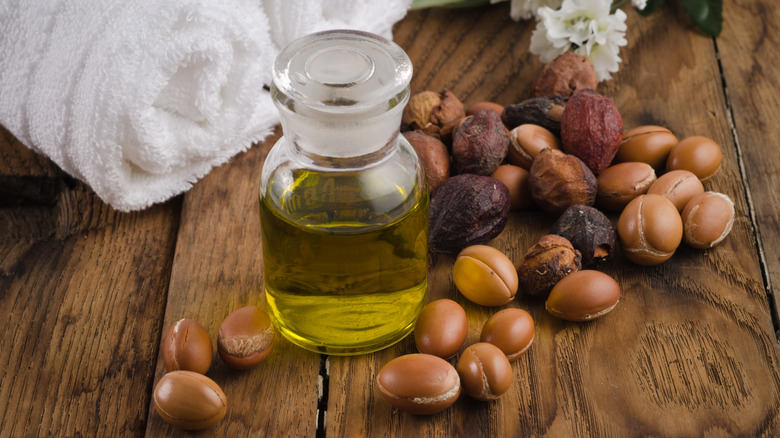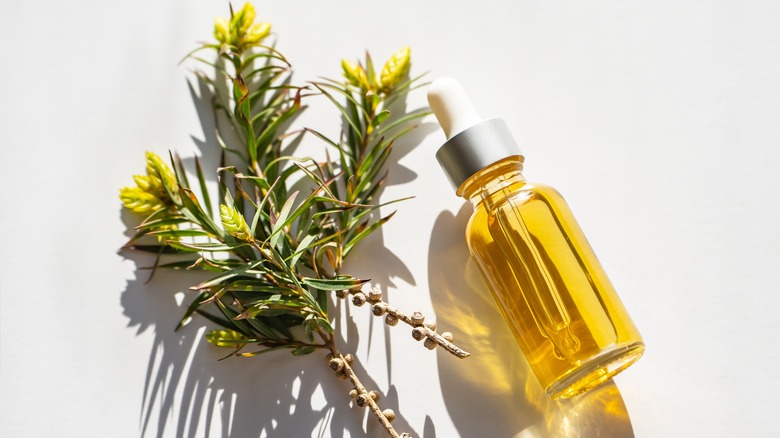Rosemary, Coconut, And Castor, Oh My! Finding The Hair Growth Oil Right For You
When transforming our lackluster locks, some people will go to great lengths. There are so many hair growth products on the market, from shampoos and conditioners to supplements. However, the solution to thicker and longer hair could be as simple as choosing the right hair growth oil. Whether you're looking to add length to your hair or hoping to thicken your strands, using oil could be the ticket to improving your hair and overall scalp health.
Of course, there are some misconceptions about hair oils. Most oils won't have your hair growing any faster. However, there are many benefits of using hair oil. Many of the products will help you to manage fallout by minimizing the daily damage that can cause breakage within the strands, making your mane appear unhealthy and thin. "Hair growth oils are serums that help restore nutrients to your scalp and increase stimulation and hair production," dermatologist Dr. Gohara tells Marie Claire. "Oils can thicken the cuticle, making the hair appear fuller. As the hydration is absorbed, the cuticle expands, giving the appearance of growth."
Meanwhile, many different types of oil can help you in your hair growth process, so let's explore your options to ensure you're picking the right oil for your hair.
Rosemary can improve hydration and blood circulation
Using rosemary oil for hair growth has become popular in recent years. Some people enjoy making rosemary water to use on their locks, while some find shampoos that contain rosemary, and others use the oil on their scalp to achieve the hair look they desire. Rosemary is a great option if you're looking to add hydration to your scalp, help combat gray hair and dandruff, and thicken your strands. "Rosemary oil can help with nourishment and locking in the hair's moisture, and it has properties that improve blood circulation to the scalp while getting rid of any bacteria that clog hair follicles," trichologist Hannah Gaboardi told Refinery 29.
Some benefits of using rosemary oil include improved circulation on the scalp, which stimulates hair follicles and prevents them from being damaged or dying. Rosemary can also aid in healing nerve damage and tissue, rejuvenating the scalp, and promoting growth in thin areas.
Using rosemary oil is also very easy. You can apply it to your scalp and massage it into the skin. This can be done before washing your hair. However, allow the oil to sit on your scalp for 5 to 10 minutes before rinsing it out. Another option is to mix it in with your shampoo while showering. Many people have seen the benefits of using rosemary for hair growth, and it may be a simple and cost-effective way to transform your hair as well.
Coconut oil has healing benefits
Coconut oil is another great option if you're looking to add some shine, moisture, and viability back into your hair. One of the most important factors in healthy hair growth is the scalp. If you have issues with your scalp, your strands will pay the price. Coconut oil can help fight infections on the scalp and prevent dandruff by calming irritations that cause itching. "It is great at locking in moisture, even for eczema-prone, dry, or sensitive skin," dermatologist Dr. Joyce Park tells Shape.
The oil also serves as a great heat protectant, which will help combat damage that occurs due to the use of blow dryers and other hot styling tools. Using coconut oil regularly can also treat split ends and breakage, allowing you to trim your hair less, and keep your locks longer. Coconut oil is also the perfect product to use at the beach or hanging by the pool, as it helps protect hair from the impact of chlorine and saltwater.
Coconut oil is best used as a hair mask and should be massaged into their hair from root to tip and covered with a towel for at least 30 minutes before rinsing it out. It can then be washed out with your usual shampoo to help you lock in hydration and heal damage from top to bottom.
Castor oil is a great option for dry and brittle hair
Castor oil is one hair growth remedy people have used for many years. The oil has many benefits, including improved scalp circulation that stimulates the hair follicles's antioxidants that protect your scalp and strands from damaging UV rays, pollution, and other toxins, and adds a gorgeous shine to your locks. However, castor oil's best feature may be the moisture that it adds to the hair and scalp.
"Castor oil works well as a moisturizing agent when found as an ingredient in conditioners and shampoos. It helps to soften and hydrate the hair and skin when it is an ingredient in your cosmetics," trichologist and hairstylist Sophia Emmanuel revealed to Prevention. Meanwhile, dermatologist Dr. Michele Green tells the outlet that the oil is best used for people who have dry and brittle hair; otherwise, it can tend to weigh down locks and give it the appearance of being greasy.
Using castor oil is easy. It works best when applied to the roots and then brushed through their hair to the ends. After that, all you need to do is leave it in for 20 minutes and then wash it out. Dr. Green also suggests using a clarifying shampoo following a castor oil treatment to ensure the oil is rinsed thoroughly from the hair.
Argan oil works great with color treated hair
If you're on a hair growth journey, argan oil is likely something you've heard of. There are many products containing the oil, and for good reason. Argan oil has many benefits that can help you achieve your hair goals. Argan has been known to prevent scalp infections that can inhibit growth, and treat dandruff. It also protects strands from heat, including the sun, and damage from coloring your hair. The oil also helps locks become more elastic and strong to prevent breakage and can give your mane a smooth and sleek look.
When it comes to hair growth, Argan oil contains plenty of Vitamin E, which is known to improve hair growth and keep strands healthy. The oil's antioxidants can also protect from fallout, giving your mane a more thick and full look over time. "Full strength argan oil is ideal on thick, curly or heavily colored hair," trichologist Mark Blake tells Byrdie, adding that a lightweight version works great for most other types of hair.
Using argan oil is as simple as finding a nourishing conditioner or a protective spray to fit into your hair care routine. "I would recommend it as a conditioner or as a styling product on the mid-lengths and ends of your hair," Blake advised. So, if you're looking to improve the overall health of your hair, argan oil may be perfect for your needs.
Tea tree oil works great in oily hair
Tea tree oil is a favorite among those who use products to boast a healthy scalp and luscious locks for a reason. The oil has many beneficial properties that can help repair damage and leave your mane looking gorgeous. In addition to fighting off scalp conditions like seborrheic dermatitis, it's also known to reduce inflammation, which can lead to hair loss. Tea tree oil can also regulate oil production on the scalp. So if you struggle with oily and greasy hair, this oil could be for you. "It is especially beneficial for those with a dry, itchy, or oily scalp, or who are dealing with dandruff or hair loss," hairstyle Bradley Leake tells Harpers Bazaar.
While tea tree oil can be a very impactful method for scalp health and preventing hair loss, dermatologist Jeannette Graf tells the outlet that the oil should be diluted before being placed on the skin, adding that those with sensitive skin may want to steer clear of the oil. Many haircare products already contain diluted tea tree oil. However, the oil can be added to a hair mask or shampoo. The oil can also be used as a scalp massage treatment to increase blood flow and stimulate hair growth.
While finding the right hair growth oil for your hair may be a challenge at first. However, the benefits may be worth it all in the end.

